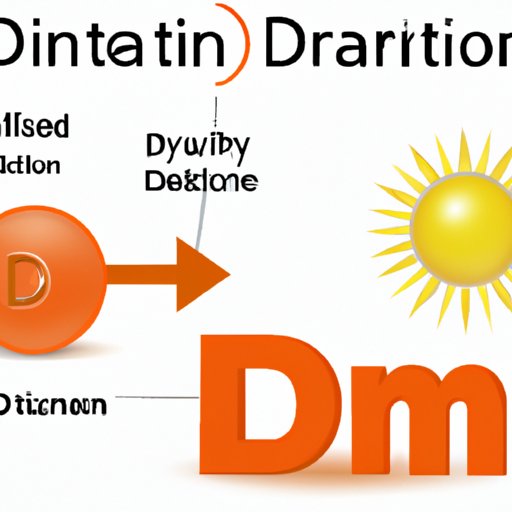
The Science of Vitamin D Absorption: How the Body Absorbs This Essential Vitamin
Vitamin D is an essential nutrient that plays a crucial role in the overall health and well-being of the body. It is necessary for the absorption of calcium and phosphorus, and it helps to maintain healthy bones and teeth. Vitamin D also helps to support the immune system, manage blood sugar levels, and reduce the risk of certain diseases.
In this article, we’ll explore the topic of Vitamin D absorption in detail. We’ll take a closer look at the science behind this process, and we’ll discuss the important role that sunlight, enzymes, and receptors play in Vitamin D absorption. We’ll also explore the link between Vitamin D absorption and overall health, debunk some common myths about this nutrient, and provide tips on how to maintain healthy Vitamin D levels in the body.
The Science of Vitamin D Absorption: Breaking Down the Process
Vitamin D absorption is a complex process that involves several factors. The first step in this process is the activation of Vitamin D in the skin when exposed to ultraviolet sunlight. The skin produces a precursor to Vitamin D called 7-dehydrocholesterol, which is then converted to Vitamin D3.
Once Vitamin D3 is formed, it travels to the liver, where it is metabolized into 25-hydroxyvitamin D (25(OH)D), the main form of Vitamin D found in the blood. From there, it travels to the kidneys, where it is converted into the active form of Vitamin D, 1,25-dihydroxyvitamin D (1,25(OH)2D).
The active form of Vitamin D then binds to Vitamin D receptors located throughout the body, including the intestines and bones. In the intestines, Vitamin D helps to increase the absorption of calcium and phosphorus, two essential nutrients necessary for maintaining strong bones and teeth. In the bones, Vitamin D helps to regulate the amount of calcium and phosphorus stored, which is critical for bone health.

Understanding the Importance of Vitamin D Absorption for Overall Health
Vitamin D is essential for overall health and well-being. It helps to regulate the immune system, manage blood sugar levels, and reduce inflammation. Vitamin D also plays a critical role in maintaining healthy bones and teeth, which is why it’s important to ensure proper absorption.
If the body doesn’t get enough Vitamin D, it can lead to a deficiency, which can have serious health implications. Symptoms of Vitamin D deficiency may include fatigue, weakness, muscle pain, bone pain, depression, and weakened immune function. Long-term deficiency can lead to conditions such as osteoporosis, hypertension, diabetes, and even cancer.
Foods that Contain Vitamin D and the Best Ways to Absorb It
One of the best ways to obtain Vitamin D is through exposure to sunlight. However, Vitamin D can also be obtained through certain foods. Some of the best food sources of Vitamin D include fatty fish such as salmon, mackerel, and tuna, egg yolks, and fortified foods such as milk, orange juice, and cereal.
The best way to enhance absorption rates of Vitamin D from these foods is to pair them with foods that contain healthy fats such as nuts, seeds, and avocado. This is because Vitamin D is a fat-soluble vitamin and needs to be absorbed by the body along with fat to be effective. Additionally, taking a Vitamin D supplement can help to ensure adequate levels of this nutrient in the body.
Debunking Common Myths About Vitamin D Absorption
There are several common misconceptions about Vitamin D absorption that can lead to confusion and result in inadequate intake of this essential nutrient. One common myth is that people don’t need to worry about getting enough Vitamin D because it’s found in many foods. However, it’s difficult to obtain adequate amounts of Vitamin D from food alone, and most people require supplementation or sun exposure to maintain healthy levels.
Another common myth is that people can obtain enough Vitamin D through exposure to indirect sunlight, such as through a window. However, the UVB rays that are necessary for Vitamin D synthesis cannot penetrate glass, so it’s important to get direct sunlight to stimulate Vitamin D production.
The Link Between Vitamin D Absorption and Bone Health
Vitamin D is essential for maintaining strong bones and teeth. It helps the body to absorb calcium, which is necessary for bone health. Without adequate levels of Vitamin D, the body cannot absorb enough calcium, which can lead to weak bones and an increased risk of fractures and osteoporosis.
Additionally, research has shown that Vitamin D deficiency is a significant risk factor for the development of several bone-related conditions, including rickets in children and osteomalacia in adults.
How Lack of Sunlight Affects Vitamin D Absorption and What You Can Do About It
While sunlight is one of the primary sources of Vitamin D, many people struggle to obtain adequate amounts, especially during the winter months. This is particularly true for people who live in northern latitudes or have darker skin, which can make it more difficult to synthesize Vitamin D from sunlight.
To ensure proper Vitamin D absorption, it’s important to seek out direct sunlight whenever possible. This might mean spending time outdoors during peak hours of sun exposure or taking advantage of sunny days by going for a walk or spending time in a garden. Additionally, taking Vitamin D supplements can help to maintain adequate levels of this nutrient in the body, especially during the winter months when sunlight is scarce.
Conclusion
Overall, proper Vitamin D absorption is critical for maintaining good health and wellness. By understanding the science behind Vitamin D absorption, the link between Vitamin D and bone health, and ways to increase Vitamin D intake through healthy food choices and sun exposure, individuals can take steps to ensure their body has adequate levels of this essential nutrient.





